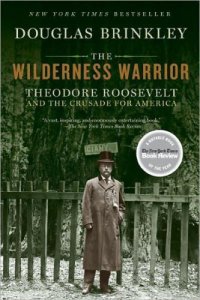
Ebook: The Wilderness Warrior
Author: Brinkley Douglas
- Tags: Conservation of natural resources, Conservation of natural resources--History.--United States, Conservation of natural resources--United States--History, Conservationists, Conservationists--United States, National parks and reserves, National parks and reserves--History.--United States, National parks and reserves--United States--History, Nature conservation, Nature conservation--History.--United States, Nature conservation--United States--History, Parks, Parks--History.--United States, Parks--United States-
- Year: 2009
- Publisher: HarperCollins
- Language: English
- mobi
The New York Times, The Boston Globe, The Kansas City Star, The Chicago Tribune, and The St. Louis Post-Dispatch
In this monumental biography, acclaimed historian Douglas Brinkley examines the life and achievements of Theodore Roosevelt, our "naturalist president," and his tireless crusade for the American wildernessa legacy now more important than ever.
Amazon.com Review
Amazon Best of the Month, August 2009: "The movement for the conversation of wild life and the larger movement for the conservation of all our natural resources are essentially democratic in spirit, purpose, and method." So wrote Theodore Roosevelt, known as the "naturalist President" for his efforts in protecting wildlife and wilderness, merging preservation and patriotism into a quintessential American ideal. The Wilderness Warrior, Douglas Brinkley's massive(ly readable) new biography, intrepidly explores the wilderness of influences (Audubon and Darwin), personal relationships (Muir and Pinchot), and frontier adventures (too many to mention) that shaped Roosevelt's proto-green views. Topping 800 pages (ironically, one wonders how many trees fell for the first printing), The Wilderness Warrior makes an excellent companion to Timothy Egan's The Big Burn and Ken Burns's The National Parks: America's Best Idea. --Jon Foro
From The New Yorker
Theodore Roosevelt spent the day of July 1, 1908, the tenth anniversary of the Battle of San Juan Hill, creating forty-five national forests. In this biographical study of T.R.s campaign to save hundreds of millions of acres of wilderness, Brinkley writes that the forestry movement would be forced down his opponents throats. Roosevelts intense love for nature was, Brinkley makes clear, a conquerors lovetriumphal Darwinismand included a blood lust in hunting the wildlife he championed. The baby bear that, in popular myth, T.R. refused to shoot was actually an adult bear that he directed to be dispatched with a knife. Brinkley fully inhabits Roosevelts mind, a condition that has its disadvantagesthe book, with blow-by-blow accounts of college hiking trips and squabbles between naturalists, does not entirely earn its nine hundred pages, making it harder to see the forests (and the story of how T.R. rescued them) for the trees.